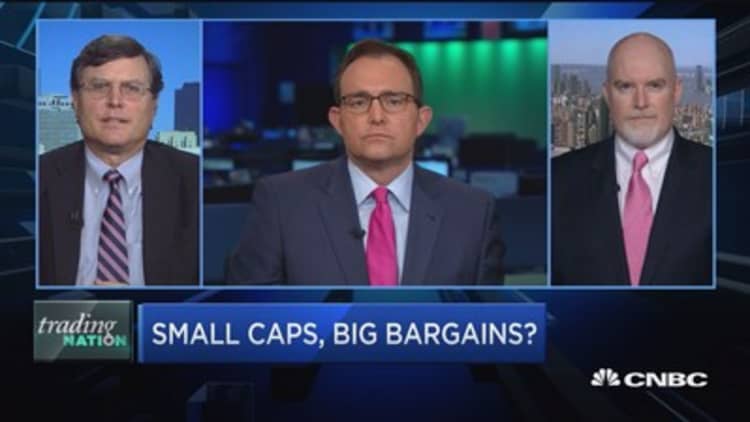
Small-cap stocks are lagging their larger-cap peers so far this year, and some market watchers say their underperformance could continue.
While the large-cap S&P 500 is up 5.5 percent since the beginning of the year, the small-cap S&P 600 is up just over 2 percent in the same time. The Russell 2000 index, tightly correlated to the S&P 600, has shown a similar trajectory. These small-cap equities surged following the U.S. election in November; the Russell 2000 rose 16 percent in the month following Election Day as investors priced in economic growth and corporate tax cuts under the Trump administration.
The S&P 600 in Wednesday trading was roughly 12 percent higher than its 200-day moving average, which may indicate a crowded trade.
"Right now, I'm a bit cautious because the Russell 2000 is 'over-owned,'" Matt Maley, Miller Tabak equity strategist, wrote to CNBC in an email Wednesday.
"The [Commitments of Traders] data shows that the dumb money 'specs' still have VERY large long positions," Maley added, referring to data that measure exchanges in the futures market, breaking down the open interest positions of major contracts that have 20 or more traders, and is often used as a contrary indicator.
Large caps may look more attractive here, according to Chad Morganlander, portfolio manager at Washington Crossing Advisors.
"I would definitely go with large caps at this point. The small caps had this huge run over the course of 2016. That was the beta trade in the later part of the year, after the election," Morganlander said Tuesday on CNBC's "Trading Nation."
Small caps have been the "beta play that needs to take a breather," he wrote in an email Tuesday to CNBC; beta refers to the volatility of a stock relative to the volatility of the broader market, and investors may have reverted these names last year intending to capitalize on the market's overall rise.
Valuations in the space, along with growth, doesn't justify being overweight small caps at this point, Morganlander said, so he would prefer shifting to large caps at this juncture.
On a technical basis, large-cap stocks are likely to outperform small caps, according to Craig Johnson, managing director and technical market strategist at Piper Jaffray.
Stocks that show better growth, over stocks that are generally value plays, are coming into favor as value lags, he said.
"At this point in time, I definitely favor the large-cap, but over the long-term, over, say two, three years, small caps, historically, have done very well," Johnson said.
In the last 20 years, the S&P 600 has far outperformed, rising 332 percent in that time while the S&P 500 has risen nearly 195 percent.





